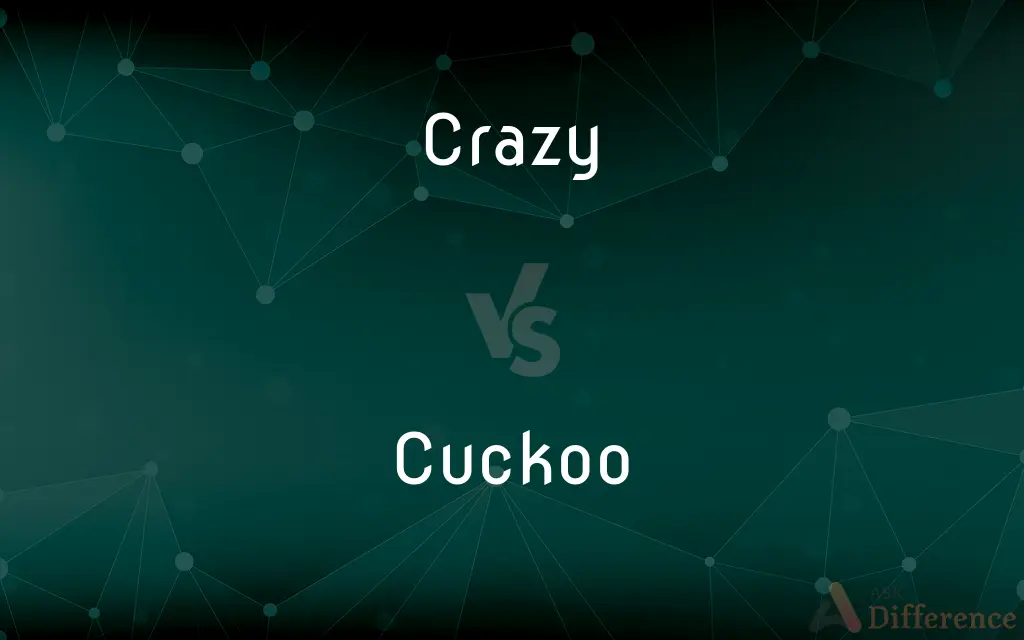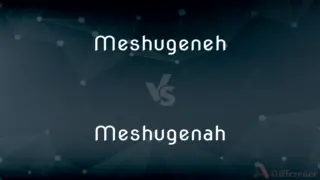Crazy vs. Cuckoo — What's the Difference?
Edited by Tayyaba Rehman — By Urooj Arif — Updated on March 17, 2024
"Crazy" generally describes actions or behavior that are irrational or nonsensical, while "cuckoo" is a colloquial term often used to suggest someone is mentally unstable or behaving in a bizarre way.

Difference Between Crazy and Cuckoo
Table of Contents
ADVERTISEMENT
Key Differences
"Crazy" is a broad term that can describe anything from actions that defy logic to people who are experiencing mental health challenges. It's used in various contexts, from casual conversations about someone's unusual decision to serious discussions about mental health. On the other hand, "cuckoo" is more colloquial and less formal, often used in a light-hearted or humorous manner to describe someone's behavior as odd or out of the ordinary.
The origin of "crazy" is more clinical and has been used historically to refer to mental illness in a wide-ranging manner. However, its usage has evolved over time, and it can now describe situations, ideas, or actions that are wild, enthusiastic, or passionate. "Cuckoo," deriving from the bird of the same name, which has a distinctive and repetitive call, conveys a sense of someone being not just irrational but also disconnected from reality, sometimes implying a lack of seriousness or a more whimsical form of craziness.
In contemporary usage, "crazy" can carry a spectrum of meanings, from negative connotations related to mental health to positive expressions of intensity or excitement. For example, it can describe an incredible experience or a person's intense passion for a hobby. Conversely, "cuckoo" is almost exclusively used to imply a lack of rationality or sense, and because of its less formal nature, it is seldom used in serious discussions about mental health.
The implications of using "crazy" can vary greatly depending on context, potentially being offensive if used to stigmatize mental illness, whereas "cuckoo" is more likely to be perceived as playful or mocking, reducing the likelihood of being taken seriously in a discussion about genuine mental health issues.
Choosing between "crazy" and "cuckoo" depends on the intended tone and seriousness of the conversation. "Crazy" can be versatile, fitting both casual and serious contexts, but requires sensitivity to potential stigma. "Cuckoo," with its inherently humorous and informal tone, is best reserved for light-hearted contexts where there's little risk of misunderstanding or offense.
ADVERTISEMENT
Comparison Chart
Definition
Describes a wide range of irrational behaviors or mental health issues.
Colloquially implies odd or whimsical behavior, suggesting mental instability.
Usage Context
Broad, ranging from casual to serious discussions.
Mostly informal and humorous contexts.
Connotation
Can be negative or positive, depending on context.
Generally light-hearted or mocking, rarely serious.
Relation to Mental Health
Historically clinical, now varied.
Seldom used in serious mental health discussions.
Examples
"That movie was crazy good!" or "This plan sounds crazy."
"He's acting a bit cuckoo today."
Tone
Versatile, can be adjusted according to context.
Playful, less likely to be appropriate for serious discussions.
Compare with Definitions
Crazy
Broadly used to describe irrational behavior, mental instability, or extreme situations.
She went crazy with the party preparations, leaving no detail untouched.
Cuckoo
Informal term suggesting someone is behaving in an odd or whimsical manner.
Wearing that outfit in this weather is a bit cuckoo.
Crazy
Evokes strong reactions, whether admiration, disbelief, or concern.
The idea seemed crazy at first, but it turned out to be genius.
Cuckoo
Rarely used in serious discussions, more for playful observations.
Planning to camp in the backyard during winter? That's rather cuckoo!
Crazy
From expressing astonishment to discussing mental health, its application is wide-ranging.
His dedication to marathon running is crazy impressive.
Cuckoo
Intended to amuse or gently mock rather than to criticize or stigmatize.
Their dance moves were so cuckoo, everyone ended up laughing and joining in.
Crazy
Can denote enthusiasm, disbelief, or concern, depending on context.
That roller coaster ride was absolutely crazy!
Cuckoo
Often in jest or to lightly tease someone for their eccentricities.
She's a bit cuckoo for collecting such unusual art.
Crazy
Can be stigmatizing if used to demean or trivialize mental health issues.
Using crazy to describe someone with mental health challenges can perpetuate stigma.
Cuckoo
While less likely to offend, its informality limits its appropriateness.
Describing someone's genuine distress as cuckoo can be dismissive.
Crazy
Mad, especially as manifested in wild or aggressive behaviour
Stella went crazy and assaulted a visitor
A crazy look
Cuckoo
Cuckoos are birds in the Cuculidae family, the sole taxon in the order Cuculiformes . The cuckoo family includes the common or European cuckoo, roadrunners, koels, malkohas, couas, coucals and anis.
Crazy
Extremely enthusiastic
I'm crazy about Cindy
A football-crazy bunch of boys
Cuckoo
A long-tailed, medium-sized bird, typically with a grey or brown back and barred or pale underparts. Many cuckoos lay their eggs in the nests of small songbirds.
Crazy
(of an angle) appearing absurdly out of place or unlikely
The monument leant at a crazy angle
Cuckoo
A mad person.
Crazy
Extremely
I've been crazy busy
Cuckoo
Mad; crazy
People think you're cuckoo
Crazy
A mad person
Keep that crazy away from me
Cuckoo
A grayish bird (Cuculus canorus) of Eurasia and Africa that has a characteristic two-note call and lays its eggs in the nests of birds of other species.
Crazy
Mentally deranged.
Cuckoo
Any of various other birds of the family Cuculidae.
Crazy
(Informal) Odd or eccentric in behavior.
Cuckoo
The call or cry of one of these birds.
Crazy
Possessed by enthusiasm or excitement
The crowd at the game went crazy.
Cuckoo
(Slang) A foolish or crazy person.
Crazy
Immoderately fond; infatuated
Was crazy about boys.
Cuckoo
To repeat incessantly, as a cuckoo does its call.
Crazy
Intensely involved or preoccupied
Is crazy about cars and racing.
Cuckoo
Lacking in sense; foolish or crazy.
Crazy
Foolish or impractical; senseless
A crazy scheme for making quick money.
Cuckoo
Any of various birds, of the family Cuculidae, famous for laying its eggs in the nests of other species; but especially a common cuckoo (Cuculus canorus), that has a characteristic two-note call.
Crazy
Intensely annoyed or irritated
It makes me crazy when you don't tell me you're going to be late.
Cuckoo
The sound of that particular bird.
Crazy
Disorderly or askew
One of the old window shutters hung at a crazy angle.
Cuckoo
The bird-shaped figure found in cuckoo clocks.
Crazy
(Informal) Extremely; very
That restaurant's always crazy busy on weekends, but it's worth the wait.
Cuckoo
The cuckoo clock itself.
Crazy
One who is or appears to be mentally deranged
"To them she is not a brusque crazy, but 'appropriately passionate'" (Mary McGrory).
Cuckoo
A person who inveigles themselves into a place where they should not be (used especially in the phrase a cuckoo in the nest).
Crazy
Of unsound mind; insane; demented.
His ideas were both frightening and crazy.
Cuckoo
(slang) Someone who is crazy.
Crazy
Out of control.
When she gets on the motorcycle she goes crazy.
Cuckoo
To make the call of a cuckoo.
Crazy
Very excited or enthusiastic.
He went crazy when he won.
Cuckoo
To repeat something incessantly. en
Crazy
In love; experiencing romantic feelings.
Why is she so crazy about him?
Cuckoo
(slang) Crazy; not sane.
I think I'm going cuckoo!
Crazy
(informal) Very unexpected; wildly surprising.
The game had a crazy ending.
Cuckoo
A bird belonging to Cuculus, Coccyzus, and several allied genera, of many species.
Crazy
(obsolete) Flawed or damaged; unsound, liable to break apart; ramshackle.
Cuckoo
A man who is a stupid incompetent fool
Crazy
(obsolete) Sickly, frail; diseased.
Cuckoo
Any of numerous European and North American birds having pointed wings and a long tail
Crazy
(slang) Very, extremely.
That trick was crazy good.
Cuckoo
Repeat monotonously, like a cuckoo repeats his call
Crazy
An insane or eccentric person; a crackpot.
Crazy
Eccentric behaviour; lunacy; craziness.
Crazy
Characterized by weakness or feebleness; decrepit; broken; falling to decay; shaky; unsafe.
Piles of mean andcrazy houses.
One of great riches, but a crazy constitution.
They . . . got a crazy boat to carry them to the island.
Crazy
Broken, weakened, or dissordered in intellect; shattered; demented; deranged.
Over moist and crazy brains.
Crazy
Inordinately desirous; foolishly eager.
The girls were crazy to be introduced to him.
Crazy
Someone deranged and possibly dangerous
Crazy
Affected with madness or insanity;
A man who had gone mad
Crazy
Foolish; totally unsound;
An impractical solution
A crazy scheme
Half-baked ideas
A screwball proposal without a prayer of working
Crazy
Marked by foolish or unreasoning fondness;
She was crazy about him
Gaga over the rock group's new album
He was infatuated with her
Crazy
Possessed by inordinate excitement;
The crowd went crazy
Was crazy to try his new bicycle
Crazy
Bizarre or fantastic;
Had a crazy dream
Wore a crazy hat
Crazy
Intensely enthusiastic about or preoccupied with;
Crazy about cars and racing
Common Curiosities
Is it acceptable to use these terms to describe mental health conditions?
Using these terms can perpetuate stigma and is generally discouraged in discussions about mental health.
Can "cuckoo" be used in formal writing?
Generally, no. It's considered too colloquial and informal for serious or formal discussions.
Why might someone choose "cuckoo" over "crazy"?
To convey a lighter, more humorous tone when describing someone's unconventional behavior.
Is "crazy" offensive?
It can be, especially if used to demean someone with mental health issues. Context matters greatly.
Are there positive ways to use "crazy"?
Yes, such as expressing enthusiasm or admiration for something extraordinary.
How has the usage of "crazy" evolved?
Its usage has broadened over time, now encompassing a range of meanings from negative to positive.
How do cultural perceptions affect the interpretation of these terms?
Cultural context can influence whether these terms are seen as derogatory, humorous, or acceptable.
Is there a shift in how society views terms related to mental health?
Yes, there's growing sensitivity towards language that might stigmatize mental health, leading to more cautious use of terms like "crazy" and "cuckoo."
Can "cuckoo" ever be considered serious?
Rarely, as its primary association is with humor and light-heartedness.
What are alternatives to using "crazy" or "cuckoo"?
Depending on context, terms like "unexpected," "surprising," "unconventional," or "unique" might be more appropriate.
Share Your Discovery

Previous Comparison
Axel vs. Axle
Next Comparison
Meshugeneh vs. MeshugenahAuthor Spotlight
Written by
Urooj ArifUrooj is a skilled content writer at Ask Difference, known for her exceptional ability to simplify complex topics into engaging and informative content. With a passion for research and a flair for clear, concise writing, she consistently delivers articles that resonate with our diverse audience.
Edited by
Tayyaba RehmanTayyaba Rehman is a distinguished writer, currently serving as a primary contributor to askdifference.com. As a researcher in semantics and etymology, Tayyaba's passion for the complexity of languages and their distinctions has found a perfect home on the platform. Tayyaba delves into the intricacies of language, distinguishing between commonly confused words and phrases, thereby providing clarity for readers worldwide.














































